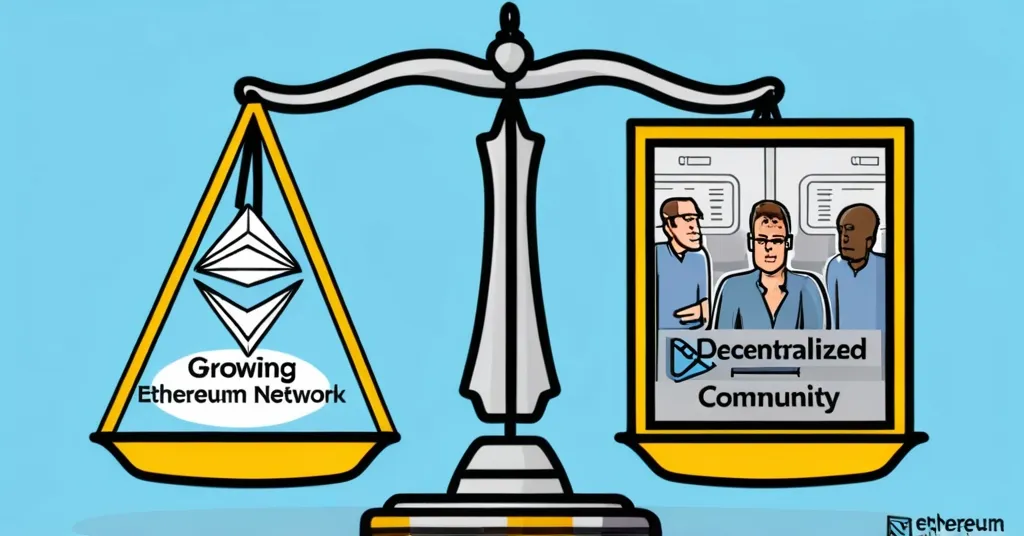Ethereum Foundation’s Balancing Act: Growth, Decentralization, and Transparency Debates

Inside the Ethereum Foundation: Balancing Power, Transparency, and Decentralization
The recent closure of “Week in Ethereum” has reignited debates about the Ethereum Foundation’s (EF) role and priorities, highlighting the ongoing tension between fostering growth and maintaining decentralization.
- Nurturing growth through grants
- Promoting decentralization
- Supporting public goods
- Community debates on transparency and public role
- Questions about funding accountability
- “Subtraction philosophy” of leadership
- Closure of “Week in Ethereum” and rise of “EtherWorld Weekly”
The Ethereum Foundation, a non-profit dedicated to Ethereum’s development, faces a complex challenge: nurturing the ecosystem’s growth while maintaining its decentralized ethos. The EF’s roles include providing grants, promoting decentralization, and supporting public goods. Yet, the community continually scrutinizes the foundation’s transparency, public role, accountability in fund allocation, and its leadership philosophy.
Transparency remains a significant concern. The community demands more frequent updates on social media, detailed reports on grants, and open forums. As Vitalik Buterin, Ethereum’s co-founder, aptly put it,
People just want to know what the EF is doing without having to dig to find it.
But is more transparency always beneficial? Some argue that too much openness could hinder the EF’s ability to perform strategic actions without public scrutiny, potentially slowing down progress. Yet, the EF’s annual budget of approximately $100 million, primarily composed of grants and salaries, necessitates a level of accountability that the community rightfully expects. The Ethereum Foundation transparency report 2023 sheds light on these issues.
The debate over whether the EF should be Ethereum’s public face is equally divisive. Hudson Jameson, a former EF member, believes,
Ethereum doesn’t need marketing. Its strength lies in its tech and community.
However, others like Ryan Sean Adams counter,
In the long run, there’s more harm than good in having a single entity as Ethereum’s face.
This tension underscores the delicate balance between representation and the risk of centralization. Is the EF’s role as a public face more harmful than beneficial? Or could it serve as a bridge for newcomers and institutions? The role of the Ethereum Foundation in this context remains a topic of discussion.
Funding accountability is another focal point. The EF’s grants have supported various projects, including the WTF Academy and Security Alliance, yet questions arise about their effectiveness and impact. Tim Beiko, a core Ethereum developer, suggests,
The community should hold grantees accountable, not just the EF.
The impact of Ethereum Foundation grants on decentralized projects is a subject of ongoing analysis.
The EF’s “subtraction philosophy,” a hands-off approach to leadership that encourages others to take the lead, is both praised for promoting true decentralization and criticized for seeming passive. This philosophy aligns with the EF’s mission but can leave some community members feeling unsupported, as evidenced by the closure of the “Week in Ethereum” newsletter created by Evan Van Ness. Its closure due to financial constraints, with minimal support from the EF, sparked discussions about resource allocation and led to the emergence of “EtherWorld Weekly,” a testament to the community’s resilience. Community reactions to these changes have been mixed.
As Ethereum evolves, the EF stands at a crossroads. It must navigate calls for greater transparency and more active leadership while staying true to its mission of fostering decentralization. The community’s strength and the foundation’s financial management will play crucial roles in shaping Ethereum’s future. Navigating Ethereum’s community is like herding cats, but with more blockchain—challenging, yet ultimately rewarding. The impact analysis of Ethereum Foundation grants provides insights into these dynamics.
Maybe the EF should just disband and let the community take over entirely? Such a move would certainly align with the ethos of decentralization, but it’s a controversial solution that would leave many questions about the ecosystem’s sustainability. Discussions on Ethereum’s decentralization through grants continue to evolve.
The future directions of the Ethereum Foundation will be crucial in addressing these challenges and opportunities.
Key Takeaways and Questions
-
What is the Ethereum Foundation’s primary role within the Ethereum ecosystem?
The Ethereum Foundation’s primary role is to nurture Ethereum’s growth, promote decentralization, and support public goods through grants and funding.
-
Why is transparency a significant concern for the Ethereum community regarding the EF?
Transparency is a significant concern because the community desires more open communication about the EF’s activities and decisions, including how grants are allocated and their impact.
-
Should the Ethereum Foundation be the public face of Ethereum?
Opinions are divided. Some believe the EF could serve as a beneficial bridge to newcomers and institutions, while others argue it might harm Ethereum’s decentralized ethos.
-
How does the EF ensure accountability in its funding decisions?
The EF faces criticism on accountability, with suggestions for mandatory updates from grantees. However, core developer Tim Beiko emphasizes that the community should also hold grantees accountable.
-
What is the EF’s “subtraction philosophy”?
The EF’s “subtraction philosophy” involves stepping back to allow others to lead, promoting true decentralization, though this approach is both appreciated and criticized within the community.
-
What impact did the closure of “Week in Ethereum” have on the Ethereum community?
The closure highlighted tensions around resource allocation and the EF’s support for community-driven projects, leading to discussions about the EF’s priorities and the emergence of new initiatives like “EtherWorld Weekly.”
-
What future directions might the Ethereum Foundation take?
The EF faces a crossroads: it could adapt to calls for greater transparency and more proactive leadership, or continue its philosophy of decentralization, with the community’s strength being a key factor.



